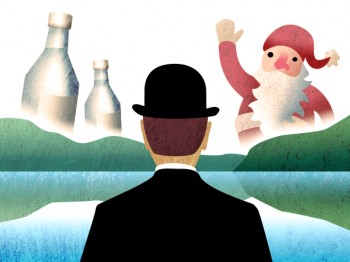Tag: Finland
The almost nearly perfect travel book
4 April 2014 | Articles, Non-fiction

Illustration: Joonas Väänänen
The question of what foreign people think of us Finns, and Finland has always been a particularly burning one in these latitudes: a young nation, a small people. Can we be as good as bigger and wealthier nations? Tommi Uschanov reads a new book on the Nordic countries published in England, keeping a sharp eye on what is being said about…. Finland, naturally
When an article based on The Almost Nearly Perfect People: The Truth About the Nordic Miracle by Michael Booth was published last January in the London Guardian, there was a nationwide outcry in Finland. ‘Finland being bashed in the British media,’ one tabloid headlined grandiosely, while a sober financial paper spoke of ‘a broadside full of stinky stuff’. It takes a re-reading of the article after having read the book to understand why. To create an artificial atmosphere of controversy, the article is lop-sidedly critical of Finland in a way which the book goes out of its way to avoid.
The Almost Nearly Perfect People belongs in a by now time-honoured genre within English letters: the humorous encomium to a host culture by an expatriate – or immigrant, as we hosts impolitely insist on calling them. The only difference is that Michael Booth, a British food and travel writer, does not discuss only Denmark, where he has lived for a decade, but visits each of the other four Nordic countries in turn. More…
Reindeer yoga?
15 July 2013 | This 'n' that

Human yoga wheel. Photo: Wikimedia
While Finnish politicians, just back at Parliament after their summer break, twiddle their thumbs in frustration as the nation faces darkening prospects for economic growth, Finland is being admired across the pond.
The Atlantic magazine took a long look at ‘the secrets of Finland’s success with schools, moms, kids – and everything’ (July 2013).
Olga Khazan reports: Finns enjoy long vacations, better school scores, unemployment insurance, paid parental leaves, cheap child care, education and medical services, and low infant mortality rates.
‘All of this adds up to the stress equivalent of living in what is essentially a vast, reindeer-fur-lined yoga studio.’
Whoa! Are we that happy in Finland? More…
Positive fools
1 April 2010 | This 'n' that
‘People who think about what others think of them are above all afraid of being ridiculed. Consider it an irony of fate or not, but the Finns in literature are usually laughable in some way or other,’ Janna Kantola – lecturer in Comparative Literature in Helsinki University – writes in an article entitled ‘Strong, thirsty and weird’, published in the 6/2009 issue of the Helsinki University Bulletin.
Mostly they drink and end up on the wrong side of the law. For example, there are Finnish seafarers in fiction by European writers whose rum bottles apparently have no bottoms.
‘Finland and the Finns appear, in particular, in thrillers from the Cold War: from Raymond Chandler’s The Long Goodbye (1953) to Alistair MacLean’s novel HMS Ulysses (1955). In these works, the unsmiling and hulking Finns have wide, horny hands, massive bottoms and the strength of a hundred men.
‘But not to worry. On a couple of occasions, Finns have even got to be the main characters of books. In these instances, the Finns no longer make people laugh but are mostly tragic, just as the characters in literature usually are when they are most interesting.
‘The main character in Richard Rayner’s novel The Cloud Sketcher (2000, USA) is an architect – a popular profession for Finns in modern literature – who has a disfigured face and a hard history, reaching America by way of the Finnish civil war. The historical novel by Helen Dunmore, House of Orphans (2006, UK), set in Finland in 1901–1904, is a love story about two young rebels, Eeva and Lauri.
One of the success stories of Finnish literature abroad are the humorous novels by Arto Paasilinna (born 1942): they have been translated into almost 40 languages. ‘Through his books Arto Paasilinna has turned being a fool into a positive characteristic. All things considered, this is something Finland will have no shortage in offering,’ Kantola concludes.

